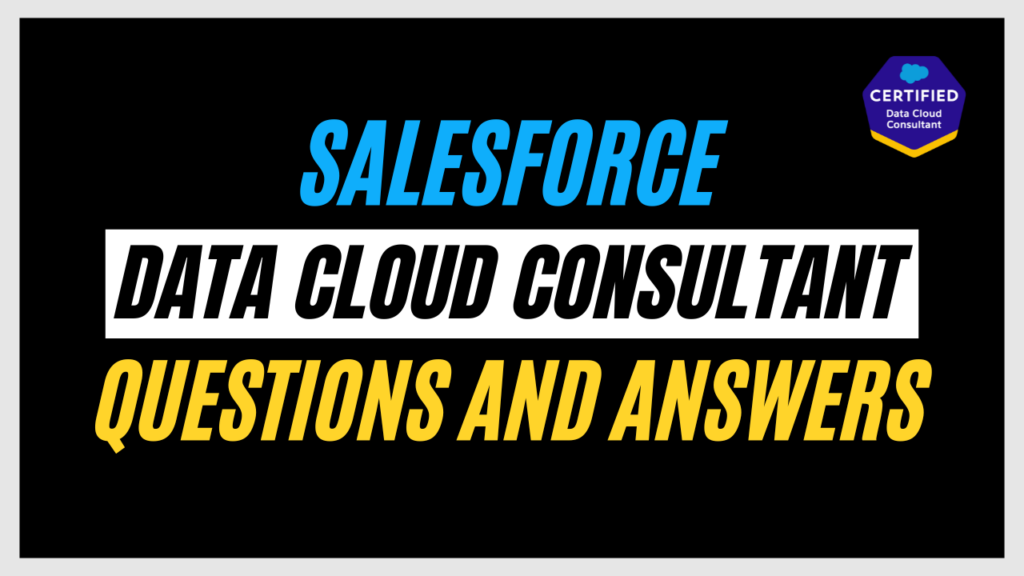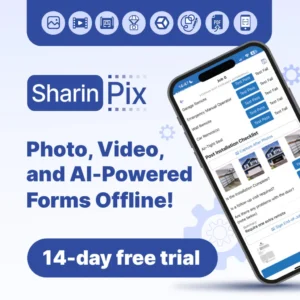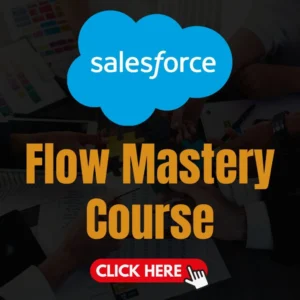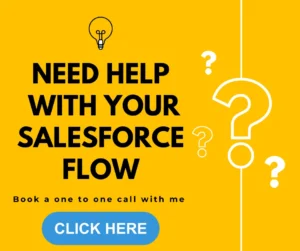If you’re a consultant with hands-on experience implementing and advising on enterprise data platforms in customer-facing roles, the Salesforce Data Cloud Consultant certification might be the perfect next step in your career.
This certification is ideal for professionals skilled in designing, configuring and architecting robust data solutions that support sustainable, scalable business needs.
About the Exam
Here’s a quick brief of what to expect for the Salesforce Data Cloud Consultant Exam:
- The exam consists of 60 multiple-choice or multiple-select questions, plus up to five additional non-scored questions.
- You’ll have 105 minutes to complete the exam.
- A score of 62% or higher is required to pass.
- The registration fee is $200 USD (plus applicable taxes), with a $100 USD retake fee if needed.
- You can take the exam at a testing centre or online in a proctored environment.
- No reference materials, either hard-copy or digital, are allowed during the exam.
- There are no prerequisites to sit for this exam, so you can register and get started anytime!
Ready to schedule your exam? Check out our blog on how to register for the Salesforce certification exam here.
Exam Curriculum
Data Cloud Overview (18%)
Data Cloud serves as a powerful tool for managing data within Salesforce, and it’s essential to understand its purpose, key terms, and the unique value it brings to businesses. Knowing when and how to use the Data Cloud in real-world scenarios is key, as is understanding how it functions and relies on other systems.
Additionally, it’s crucial to follow data ethics principles when working with data in the Data Cloud.
Data Cloud Setup and Administration (12%)
Setting up Data Cloud requires configuring permissions, permission sets, and general settings across your organization. You’ll need to be familiar with different types of data streams and bundles and know when and how to use data spaces based on specific needs.
Once Data Cloud is set up, you’ll manage it with reports, dashboards, flows, and data kits, and troubleshoot issues with tools like Data Explorer, Profile Explorer, and APIs.
Data Ingestion and Modeling (20%)
Data ingestion involves bringing in data from various sources and understanding the transformation capabilities Data Cloud offers. To ensure accuracy and utility, you’ll need to define, map, and model data according to best practices, especially if identity resolution is required.
Tools are also available to check the quality of the ingested data and confirm it meets requirements.
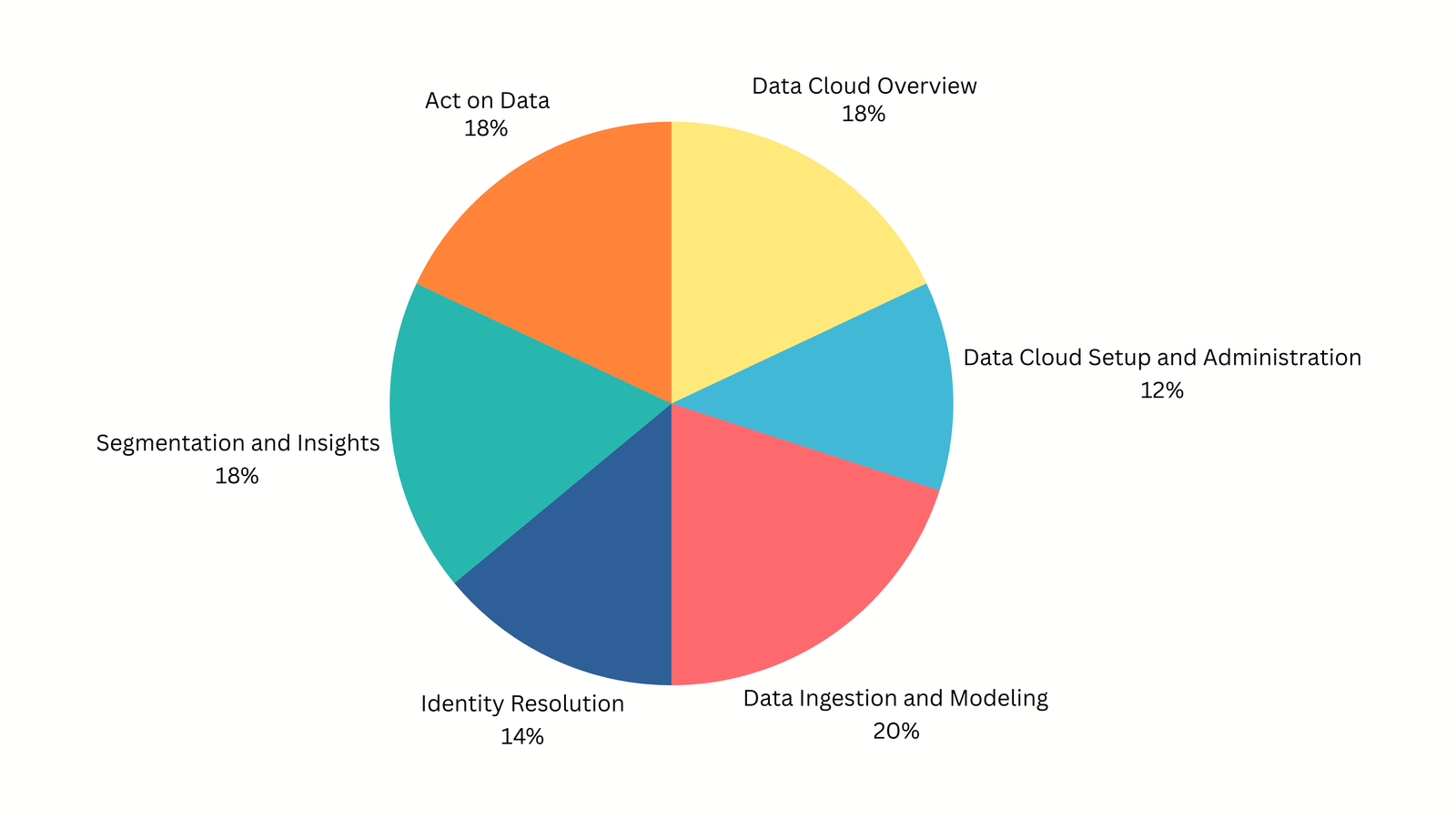
Identity Resolution (14%)
Identity resolution focuses on matching data and using rule sets to reconcile information effectively. You’ll understand the outcomes of identity resolution and learn how it applies to specific business situations.
Segmentation and Insights (18%)
Segmentation involves grouping data, and it’s essential to understand the main concepts and various use cases. You’ll learn to configure and adjust segments as needed and distinguish between calculated insights and streaming insights for different analysis purposes.
Act on Data (18%)
Activations, which are data-triggered actions, are fundamental in Data Cloud. You’ll explore their primary uses, how attributes and related attributes are managed, and how timing impacts the data lifecycle.
Additionally, you’ll learn to handle common issues with activations, such as accepted and rejected data counts, errors, and troubleshooting missing attributes, along with understanding the requirements for data actions.
Question 1. What is the maximum amount of time available for the time filter in data graphs?
Answer – 30 Days
Question 2. How can you find the Functional Domain (FD) of your Data Cloud instance?
Answer – From Setup, select Data Cloud Setup, and then Setup Home
Question 3. Which Data Cloud feature helps calculate reusable attributes such as Customer Lifetime Value and Customer Satisfaction Score?
Answer – Calculated Insights
Question 4. How many data graphs per org are allowed in Data Cloud?
Answer – 10
Question 5. Which method does Data Cloud use for identifying individuals?
Answer – Deterministic matching and Probabilistic matching
Question 6. What is the total number of data actions per tenant in Data Cloud?
Answer – 100
Question 7. How can you import data into Marketing Cloud Data Extension?
Answer – Use enhanced FTP
Question 8. What is the purpose of a Data Stream in a Data Cloud?
Answer – Viewing ingested data
Question 9. What is the maximum number of fields of a single type in a data stream in Data Cloud?
Answer – 800
Question 10. Which pattern does the Data Cloud Ingestion API use to synchronize micro-batches of updates between the source system and Data Cloud in near-real time?
Answer – Fire-and-forget


